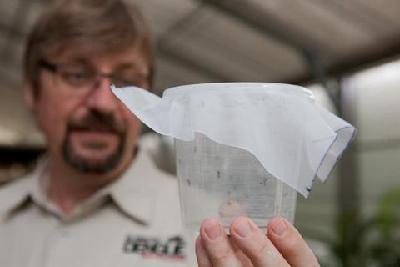
This is the VOA Special English Health Report.
Dengue fever feels like a severe case of the flu, including pain in the muscles and joints. The World Health Organization says there may be 50 million dengue infections every year. Deaths are rare, fewer than 13,000 a year. But dengue has spread sharply since the 1970s.
The disease is found mostly in cities. The WHO says 40 percent of the world's population is now at risk in more than 100 countries. Southeast Asia and the Western Pacific are the most affected. Dengue is also found in Africa, the Americas and the eastern Mediterranean.
There is no vaccine against dengue and no special treatment.
Scott Ritchie of James Cook University in Queensland, Australia, says control efforts target the mosquitoes that spread dengue.
SCOTT RITCHIE: "And the only way to control it is through the use of pesticides and perhaps community education, and some of the mosquitoes are getting resistant to those pesticides, so we need something novel and different."
Something different is what he and other scientists from Australia and the United States are working on. They blocked the growth of dengue virus in mosquitoes by infecting them with a kind of bacteria called Wolbachia pipientis. Wolbachia is commonly found in fruit flies and is safe for people.
The researchers released mosquitoes infected with Wolbachia into an indoor test area filled with uninfected mosquitoes. The infected ones mated with the uninfected ones and successfully spread the bacteria.
The researchers then tried their experiment outdoors. Over a two-month period they released more than 300,000 infected mosquitoes in two Australian towns far from large cities.
Scott O'Neill at Monash University in Melbourne says the mosquitoes quickly infected wild populations just as they had in the indoor test.
SCOTT O'NEILL: "And then, most importantly, once the release has stopped, the Wolbachia continued to increase until the experiments came to a conclusion at the end of the wet season. And about that time we can see that we have almost complete penetration of the Wolbachia infection into the mosquito population at these sites."
Next, the plan is to do tests over the next two to three years in an area where many people are infected with dengue. Ary Hoffman at the University of Melbourne says the tests will show if the idea can actually prevent the disease.
ARY HOFFMAN: "You know, at the moment we're very hopeful. But before we get to the stage where we can say 'Hey, Wolbachia can control dengue,' that's a different matter. That's a bit down the track."
The researchers described their work in two papers last week in the journal Nature.
Mosquitoes also spread malaria. The kind of mosquito that injects the malaria parasite into the people it bites is most active around sunset and sunrise. So bed nets can help protect people while they sleep. But the mosquito that spreads dengue, Aedes aegypti, is most active during the day.
And that's the VOA Special English Health Report. I'm Shirley Griffith.
Wolbachia: 沃爾巴克氏體菌
Aedes aegypti: 埃及伊蚊
Malaysia uses mosquitoes in dengue fever battle
Scientists see progress on a dengue vaccine
Microbe could help battle malaria
(來(lái)源:VOA 編輯:崔旭燕)
